AP – Joe Wong sweats through his days as a cleaner in a Hong Kong housing complex, labouring in narrow, stuffy corridors that this summer and last were the worst he’s known.
He finds what relief he can in a resting area where a fan offers a breeze and a refrigerator holds the cool water he drinks – seven and a half litres a day – to ward off heatstroke.
“All my cleaner friends make fun about my resting place, they call it a palace,” Wong said.
“I am very lucky.”
As earth sweltered to its hottest northern hemisphere summer ever recorded, Hong Kong shared in the misery. The city, already known for oppressive humidity, endured its own record-breaking summer for heat, including August’s monthly mean temperature of 29.7 degrees Celsius (oC). Residents spent half the month under very hot weather warnings.
In the weeks since fall officially began in late September, temperatures have been slowly dropping.
But the sweltering summer won’t soon be forgotten, and for many residents there is worry about future heat waves. As in so many other places, the burden of this summer’s heat often fell hardest on Hong Kong’s most vulnerable, who don’t have or can’t afford air conditioning to cope with the heat.
Fifty-two-year-old security guard Chan is among the many people who simply has no access to air conditioning. Chan – who like many of the people interviewed for this story would give only her last name due to feelings of shame over her modest living arrangement – spends a big chunk of her monthly income to rent the 24-square-foot room she shares with another person, sleeping in bunk beds.
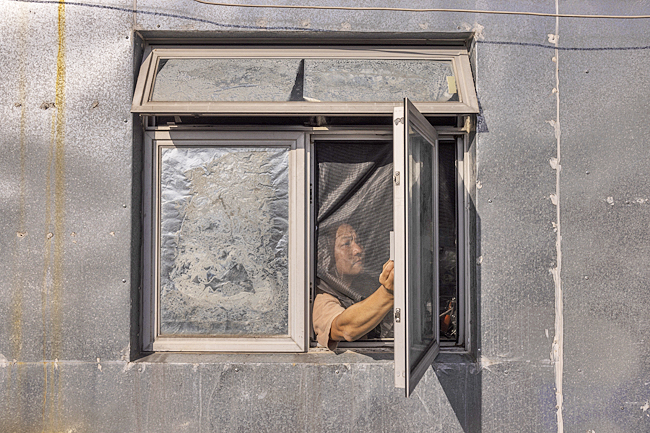
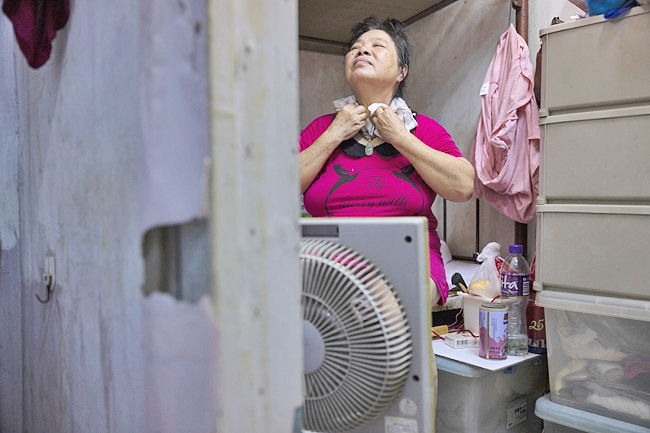

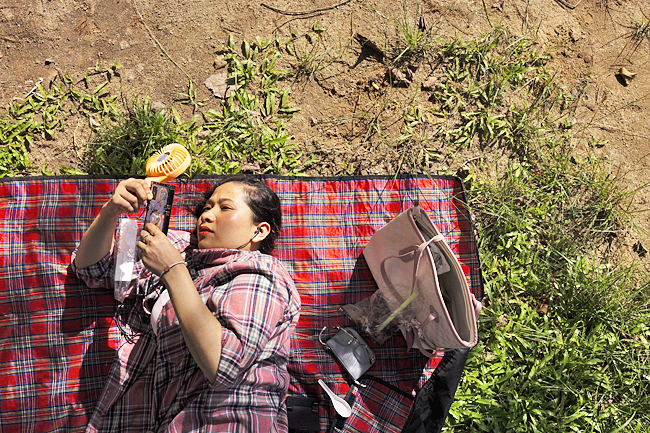
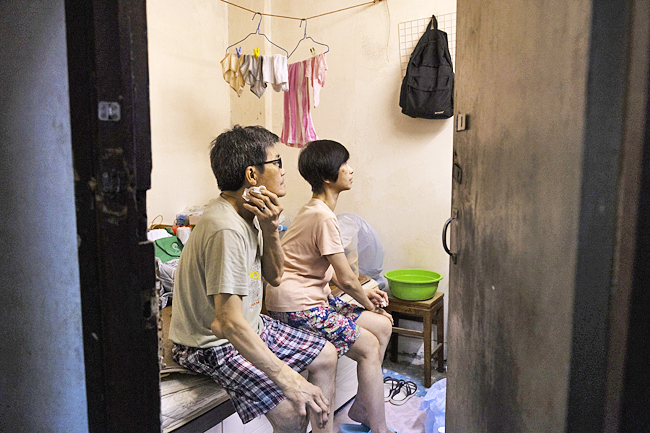
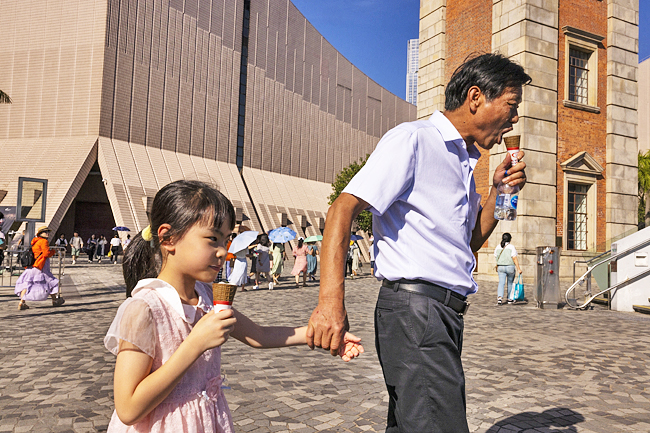
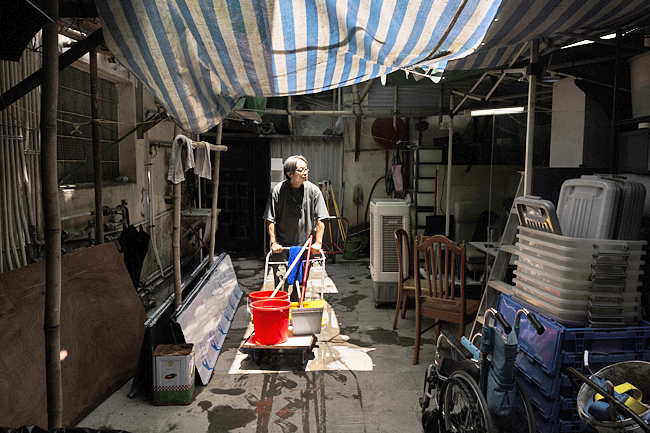
When she’s off work, Chan stays outside in the street or goes to a park to get some air until returning home late to sleep.
Fifty-year-old cleaner Lun has air conditioning in his subdivided flat in the Mong Kok district – one of the most densely populated spots on earth, with an average of 130,000 people per square kilometre.
But Lun uses it for only a couple of hours before going to sleep. He often goes to a McDonald’s to watch TV on his phone and enjoy free air conditioning.
Hong Kong has some 340,000 migrant domestic workers, or about five per cent of the city’s population. Most have to stay at their employer’s house in bleak living arrangements.
That includes, 41-year-old domestic worker Isdalia from Indonesia who stays in a kitchen storage area without air conditioning. Many of her friends endure the same conditions, she said.
“I spend most of the time cooking in the kitchen,” Isdalia said. “There is no ventilation, and it heats up my room. It’s like I’m being cooked in there too. I live drenched in sweat all day long.”
Migrant domestic workers in Hong Kong are entitled to one day off per week, often on Sunday. Isdalia and her friends sometimes go to Victoria Park to sit among shade trees.
“Everywhere is too hot. The ground on the streets burns; there is no way you can sit. At least there is some grass here and we can lie down,” she said.
Li, 50, used to live in a subdivided flat. After losing his job, he moved with his elderly mother and younger brother to one of several huts atop a 14-storey industrial building in the Kowloon area. The Li family rarely turns on the air conditioning due to the cost, doing their best without it. He put fabric around all his windows to block the sun. He usually takes his coffee in the early morning outside near several plants to stay cool.
“Around 8am the sun is already too strong to stay outside,” Li said.
Another person named Li – a 78-year-old security guard who would only give his last name – shares a flat with six other households. He said living without air conditioning is hardest when it comes to sleeping.
“I cannot sleep at all,” the guard said. “It is way too hot, you cannot breathe inside.” The difficult nights then make it hard to get through his 12-hour shifts without falling asleep, he said.
A restaurant waiter Simon Ho, 63, and his wife a part-time babysitter Elaine, 63, share a windowless room in a subdivided flat they’ve occupied for six years as they wait for space in public housing. They have air conditioning, but turn it only for an hour before going to sleep – only to be awakened later by the rising heat.
Deputy Director Sze Lai-shan of the human rights group Society for Community Organization (SoCo) said the most effective solution for lower-income Hong Kong residents against rising heat would be to get them into public housing. Another would be for the government to provide electricity subsidies that could make air conditioning affordable.
“Their most frequent complaint is that they cannot sleep,” Sze said. “The other one is about how heat brings more rats, bed bugs and mosquitoes at their home. They know it’s going to get worse and hotter so that’s why they are so concerned about when can they get rehoused to public housing.”
Working outside in such heat and humidity can be dangerous.
Fun Lam, 56, has been working as a gardener for seven years in Victoria Park, including a bout of heatstroke last year that left her struggling to breathe and move. She’s had to find ways to adapt, including often taking her lunch break in the air conditioning of a nearby public library.
“Now I drink at least four litres of water per day at work,” she said. “I put a wet towel on my head, so the sun doesn’t burn my hair and my forehead.”
Cleaner Wong suffered from heat rash this summer despite wearing a portable fan on his belt and a cooling patch on his forehead to cope with the worst of the heat. As the chairman of the now defunct Hong Kong Confederation of Trade Unions, which had been the city’s largest independent trade union, Wong said he had heard more and more complaints from cleaners about heat stress.
In May, the government introduced voluntary guidelines on heat stress prevention to remind employers to take appropriate measures for outdoor. Wong dismissed those as totally useless for their non-binding nature.
Waitress Ying, 50, shares another tiny rooftop hut with two people and said the past two summers have been the worst in her five years living there.
The metal structure gets so hot in daytime it’s dangerous to touch, and temperatures inside often went past 36oC, she said. But she never turns on the air conditioning due to expense, and rarely opens her window because of rats on the roof.
“The whole house feels like an oven. It’s like my skin is burning,” she said. “Even at night.”
Ying, like the security guard Li, earns just a little too much to qualify for public housing.


